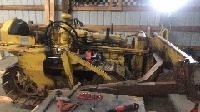- Posts: 15
- Thank you received: 5

ACMOC Membership Benefits
- FREE quarterly magazine filled with content about antique Caterpillar machines
- FREE classified listings
- ACMOC store discounts and specials
- Full Bulletin Board Access
- Marketplace (For Sale/Wanted)
- Technical Library
- Post attachments
$44 /year ELECTRONIC
$60 /year USA
$77 /year International
Radiator material
any tips and tricks would be appreciated, thanks for all the help guys.
Ross
Please Log in or Create an account to join the conversation.
- ctsnowfighter
-

- Offline
- Platinum Boarder
- User
- Posts: 995
- Thank you received: 495
Bronze is an alloy of copper and tin, maybe some other elements too.
As such, copper being the primary metal, lead/tin solder will bond to either one of them - IF - it is clean!
"Clean" may require the use of strong acids and that can be hazardous both from dermal burns and inhalation of the fumes, especially when heated.
I knew a "radiator man" that said in extreme cases he had used Nitric Acid - that is a very dangerous and life threatening product in several ways but it was very effective when the others did not work.
Some radiator cores may be of aluminum or other metals. As such, they may not respond to solder as we commonly know lead/tin alloys.
If you have a few tubes leaking and you heat excessively as in melting Brazing rod - are you going to defeat your original purpose and warp the plate or de-bond the other tubes?
You might consider some of the "cold" based modern epoxies if they are suitable for the application.
CTS
Please Log in or Create an account to join the conversation.
Some of the early radiators are made of steel as I have a few on my machines.
Regards
Daryl
1937 RD4 4G4368
1940 D4 7J3717
1942 D4 7J9915SP
1942 R4 6G2550SP
1944 D4 2T6584SP
1945 D4 2T8978SP
1946 D4 5T6271
1956 D4 7U37855
1954 DH226 S/N 89 Howard Tug
Please Log in or Create an account to join the conversation.
- trainzkid88
-

- Offline
- Platinum Boarder
- Member
- Posts: 2062
- Thank you received: 770
the secret in soldering is have clean material and heat it properly over heating actually cuases problems too.
if you get the core hot tanked it will clean it up properly.
Please Log in or Create an account to join the conversation.
Please Log in or Create an account to join the conversation.
- ctsnowfighter
-

- Offline
- Platinum Boarder
- User
- Posts: 995
- Thank you received: 495
Oxy-Acetylene is in most cases is way too hot and difficult to control, especially on thin materials.
Propane (LPG) & Mapp gas is more friendly to soldering. MAPP is hotter (more BTU's)
Years ago, the common practice was to use Soldering Irons ( actually COPPER) that were heated, tinned and used for the heat source.
Very effective when used properly and there is no open flame involved in the actual soldering process. They are now difficult to find, maybe flea or swap meet for starters.
Sal Amonniac (spelling) was used to help clean and tin the copper.
I would suggest if you have not done much soldering, you practice on some scrap materials and gain some competence before tackling a radiator with multiple soldered joints.
Remember CLEAN surfaces and that solder will always run toward the heat.
Solder comes in several forms, each with their own general uses. Acid Core - general work, Rosin Core- electrical and Solid bar or wire (no flux)
There are also different alloys, 50/50 being quite common.
For use in copper plumbing, lead free is now mandatory and it too uses special fluxes and care.
CTS
Please Log in or Create an account to join the conversation.
- trainzkid88
-

- Offline
- Platinum Boarder
- Member
- Posts: 2062
- Thank you received: 770
my great grandfather was a plumber he would get those copper irons so hot they would whistle as you used them.
Please Log in or Create an account to join the conversation.
ACMOC
Antique Caterpillar Machinery Owners Club
1115 Madison St NE # 1117
Salem, OR 97301
cat@acmoc.org
"I became a member recently because the wealth of knowledge here is priceless."
- Chris R
"I also joined a year ago. had been on here a couple of times as a non-member and found the info very helpful so I got a one year subscription (not very expensive at all) to try it out. I really like all the resources on here so I just got a three year. I think its a very small price for what you can get out of this site."
- Jason N


